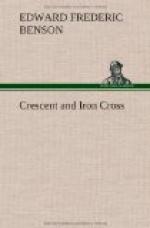There is the text that was expanded into the discourse of murder; it is the definition of a policy. Within a few years there followed the European War, and that probably was the immediate cause of its being put into effect. No more admirable opportunity for Ottomanisation could present itself, for the entry of Turkey into the war was most unpopular with the bulk of the Turkish population, and it was advisable to bribe them into acceptance of it. The bribe was the houses, the property, the money and the trade that throughout the length and breadth of Turkey was in Armenian hands. For the Armenians were by far the wealthiest of the alien populations, and some 90 per cent. of Turkish trade passed through their shops and offices. Here, then, was the psychological moment: Turkey for the Turk was the aim of the Committee of Union and Progress, and with a discontented population, unwilling to fight, the moment had come for restoring to the Turk this mass of property which at present belonged to an alien race. War might have its drawbacks and its clouds, but war would be seen to have its advantages and its silver linings, if out of it there came this legacy of Armenian wealth. And by the same stroke Turkey could get rid of those thousands of meddlesome missionaries, American and French, who spread religion and learning and other undesirable things among the cursed race. Once remove the cursed race, and there would be an end of their instructors also, for there would be none to instruct. ‘Thanks to their schools,’ so we read in the Hilal, an organ of the Young Turks, ’foreigners were able to exercise great moral influence over the young men of the country.... By closing them (i.e. by exterminating their pupils) the Government has put an end to a situation as humiliating as it was dangerous.’
Such, then, was the spirit that animated Enver and Talaat, and during the winter of 1914-15 they perfected their plans. The Armenian race was to cease, and the Valis and other officials were, each in his district, to see to the thoroughness of its cessation. Sometimes, as happened at Erzerum, the Vali in question, not having the broad out-look of Enver, or quaintly and curiously having a womanish objection to the national duty of flogging men to death and giving over young girls to a barbarous soldiery, remonstrated with the authorities, or even refused to obey orders. Such a one was instantly removed from his office, and a stauncher patriot substituted. All was put on an orderly footing: here Kurds were to be employed on the old Abdul Hamid formula, who by way of wage would enjoy the privilege of raping as many women and girls out of their hapless convoy as seemed desirable, while in agricultural districts they were allowed also to take over the sheep and cattle of their murdered victims. Here, in towns where there was more chance of resistance than in scattered homesteads, it would be wise to employ regular troops, backed, if necessary, by artillery, to whom would be entrusted




